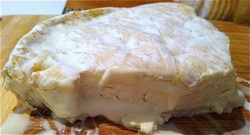
The ooze of tonight's Reblechon at temperature.
Abiogenesis is the theory of how biological life could arise from inorganic matter through natural processes. This Darwinian spontaneous generation theory utilized a concept of Primordial Soup or Primordial Ooze as the basis by saying that this "ooze" or "soup" was a collection of key ingredients needing only the right catalyst to spontaneously generate living matter. Lost yet? Well, this sounds an awful lot like the beauty of the chemistry behind oozy, ripening cheese. Cheese is nothing more than a collection of ingredients and conditions that appear to just spontaneously form, grow, and break down. And amazingly enough, many of the ingredients described by early scientists as being necessary for Primordial Ooze (ammonia, phosphoric salts, lights, heat, electricity, etc) are key to the creation of ooze in cheese. That's not all. There are more primordial connections to this story.
Guess who finally dispelled the theory of Abiogenesis (or spontaneous generation)? It was none other than Milk's Grandfather, Louis Pasteur himself. That's right. Pasteur conducted bacterial experiments (along the way to his pasteurization process) that proved that generation from static compounds or combinations cannot occur without reaction from an outside living force (in his case, outside bacteria). Pasteur said the following in 1864 after his biogenesis experiments with bacteria, "Never will the doctrine of spontaneous generation recover from the mortal blow struck by this simple experiment." And just like that, Darwin had begun to lose key scientific ground. His nemesis...ooze.
But wait, there's more! Just when we thought Primordial Ooze was a dead theory, scientists studying the deep oceans still coin the phase "Primordial Ooze" to represent the layer of ooze at the bottom of deep oceans (2 miles or more deep). Historically connected to Abiogenesis, this "ooze" today is a combination of decomposing plant material and animal matter, silt, ingredients like ammonia, phosphorus, sulfur, and of course salt (sound familiar?). Of course there are still theorists that claim many of the great unsolved scientific mysteries surrounding origins of life have yet to be explained because the answers lie hidden underwater. It's hard to argue that point when thousands of new species are discovered every year in the deep oceans, and-
WAIT!!
What's this got to do with cheese you say?
It's simple. Ooze is gross, cool, yucky, sticky, fun, ever so mysterious, and for whatever reason scientifically significant. It can gross us out or excite us, and scientists in multiple disciplines have tried to argue that all life itself came from ooze. Some scientists say deep-ocean ooze represents origins of our species, and other simply credit it as the lifeblood of a healthy ocean (settling and upwelling). And then there is Louis. Louis Pasteur studied ooze with great intention, and today's cheese would not be the same without his "ooze-work". And last but not least, cheese fans will tell you that the gooey ooze of a perfectly ripe cheese can be a wonderful reason for living.
Now, time to go finish that Reblechon...
Tommy Reddicks
www.cheesedesert.com
Guess who finally dispelled the theory of Abiogenesis (or spontaneous generation)? It was none other than Milk's Grandfather, Louis Pasteur himself. That's right. Pasteur conducted bacterial experiments (along the way to his pasteurization process) that proved that generation from static compounds or combinations cannot occur without reaction from an outside living force (in his case, outside bacteria). Pasteur said the following in 1864 after his biogenesis experiments with bacteria, "Never will the doctrine of spontaneous generation recover from the mortal blow struck by this simple experiment." And just like that, Darwin had begun to lose key scientific ground. His nemesis...ooze.
But wait, there's more! Just when we thought Primordial Ooze was a dead theory, scientists studying the deep oceans still coin the phase "Primordial Ooze" to represent the layer of ooze at the bottom of deep oceans (2 miles or more deep). Historically connected to Abiogenesis, this "ooze" today is a combination of decomposing plant material and animal matter, silt, ingredients like ammonia, phosphorus, sulfur, and of course salt (sound familiar?). Of course there are still theorists that claim many of the great unsolved scientific mysteries surrounding origins of life have yet to be explained because the answers lie hidden underwater. It's hard to argue that point when thousands of new species are discovered every year in the deep oceans, and-
WAIT!!
What's this got to do with cheese you say?
It's simple. Ooze is gross, cool, yucky, sticky, fun, ever so mysterious, and for whatever reason scientifically significant. It can gross us out or excite us, and scientists in multiple disciplines have tried to argue that all life itself came from ooze. Some scientists say deep-ocean ooze represents origins of our species, and other simply credit it as the lifeblood of a healthy ocean (settling and upwelling). And then there is Louis. Louis Pasteur studied ooze with great intention, and today's cheese would not be the same without his "ooze-work". And last but not least, cheese fans will tell you that the gooey ooze of a perfectly ripe cheese can be a wonderful reason for living.
Now, time to go finish that Reblechon...
Tommy Reddicks
www.cheesedesert.com
